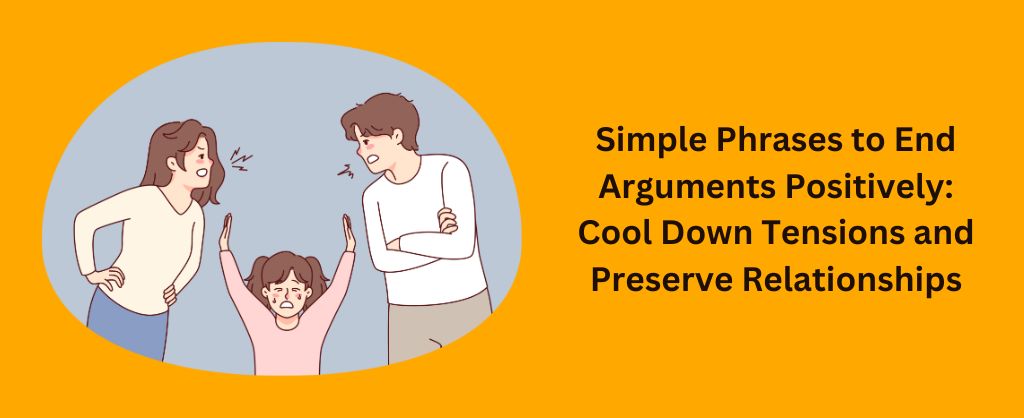10 Tips for Resolving Conflicts and Ending Any Argument Positively

Let’s be honest – arguments happen. As much as we wish the people in our lives would always see eye-to-eye with us, disagreements and conflicts are inevitable.
But here’s the good news: arguments don’t have to damage our relationships. In fact, if handled mindfully, fights can actually bring us closer together.
This comprehensive guide will teach you:
- How to have constructive arguments that bring you together, not pull you apart
- Phrases to use before, during and after fights to communicate effectively
- Tips to end disagreements positively while preserving the relationship
- When and how to press pause on heated arguments before things get out of hand
- How to seek help from a counselor or mediator when conflicts become destructive
How to Have Constructive Arguments That Strengthen Bonds
The key to ensuring arguments strengthen, rather than damage, your relationships is maintaining one fundamental mindset shift.
The secret is learning how to end arguments positively and constructively, without letting tensions escalate into hurtful territory. With some effort, empathy and communication skills, you can turn disagreements into opportunities to grow closer and gain understanding – instead of driving wedges between you.
Make preserving the relationship your #1 priority, not winning the argument.
Approach disagreements as opportunities to gain insight into each other’s perspectives, not contests to prove yourself right at all costs.
Here are tips for having constructive conflicts:
Listen Fully Before Responding
When the other person first voices their complaint or perspective, avoid mentally formulating your rebuttal while they speak.
Give them your complete, undivided attention. Make it your goal to truly understand where they are coming from rather than rushing to defend yourself.
You can validate that you’re listening by:
- Summarizing their key points
- Asking clarifying questions
- Digging for more details about why they feel a certain way
Not only does this help you have a productive discussion, but it also makes the other person feel genuinely heard and cared for.
Express Empathy Before Explaining Your Side
After fully listening, seek first to understand more by expressing empathy for their perspective.
You can say things like:
- “I can see how my failure to finish the work made you feel incredibly hurt. You must have felt quite frustrated and let down by that. I’m sorry.”
- “Your feelings make complete sense to me. I think I’d feel exactly the same if I were in your shoes.”
Showing empathy defuses tension and paves the way for a calm, rational discussion. It also makes the other person more willing to hear your viewpoint once you share it.
Find Common Ground and Agree Where Possible
Before getting into the disagreements, look for areas where you already see eye-to-eye.
Build goodwill by pointing out shared goals and interests:
- “I completely agree that it’s crucial to honor your promises to friends. I want to be a trustworthy person for you.”
- “You’re absolutely right that my last-minute cancellation was rude. I want us to have faith in one another.”
Establishing common ground sets the tone that you’re both on the same team committed to mutual understanding.
Take Responsibility for Your Part
Even if external factors were also involved, take personal ownership of your contribution to the situation without making excuses.
You might say:
- “You have every right to be upset with me. I should have let you know much sooner if I needed to reschedule. I clearly dropped the ball here – that’s 100% on me. I sincerely apologize.”
- “Whatever my motivations, I acted irresponsibly and abruptly changed our plans. You deserved better. This was my fault, and I take full responsibility.”
Taking responsibility defuses defensiveness and prevents unhelpful blame games. It allows you to have a solutions-focused discussion.
Share Your Perspective Calmly and Respectfully
Once you’ve tuned into their viewpoint and taken ownership, you can share yours. Explain where you’re coming from using “I feel” statements rather than accusations like “You did this.”
Some examples:
- “I understand why you’re upset. When you’re ready to hear me, I’d like to explain my perspective on this situation. There were some personal issues I was dealing with that led to me cancelling.”
- “I want you to understand my perspective as well. Would you be open to letting me share my experience of what happened?”
Invite them to correct your assumptions. This shows you’re open to understanding their viewpoint fully:
- “Please let me know if I’ve got anything in this wrong or misunderstood.”
Look for Mutual Solutions and Compromises
Many arguments at their core come from conflicting needs or priorities. Where possible, look for solutions where you both get your core needs met:
- “I truly want to mend our relationship. What do you feel we need to do going forward so this doesn’t happen again?”
- “It seems like there are things we both want and value here. What ideas do you have for resolving this in a way we’re both reasonably happy with?”
Identify win-win compromises and commit to following through on them.
If Needed, Agree to Disagree and Move Forward
For deeply rooted disagreements, you may need to agree to disagree – at least for the time being. If you’ve reached an impasse after trying to find common ground:
- “I think that for the time being, we need to put our differences aside. I understand if we don’t see eye-to-eye, but I want us to keep communicating constructively.”
- “We clearly have different viewpoints here. Maybe we can accept that gracefully, and I can try to be more thoughtful about this going forward.”
Mutually committing to letting go of the conflict prevents further tension. You can revisit the issue again later in a calm state.
End on a Positive Note with Appreciation
Before concluding the argument, express genuine appreciation for their openness to engage with you constructively:
- “I appreciate you talking things out with me even though I know it wasn’t easy. I really appreciate you hearing me out and sharing your perspective – it means a lot to me.”
- “Even when it’s uncomfortable, having candid conversations like this one makes me feel much more connected to you. I really value that.”
If appropriate, a hug or friendly touch can further solidify that the bond between you remains.
Helpful Phrases to Communicate Effectively in Arguments
Having the right mindset is crucial, but the exact words you choose also matter when communicating during heated conversations.
Here are phrases you can use at different stages of arguments to de-escalate tensions and foster understanding:
Before the Argument
Set the tone for a productive discussion from the very start:
- “I can see you’re upset. I’d like for us to talk through this, but calmly and constructively. Are you open to that?”
- “I want us to be able to resolve our disagreements amicably. Do you feel ready to have a conversation where we both feel heard?”
Making your positive intentions clear helps align you constructively.
During the Argument
Use these phrases to defuse tension when emotions run high:
To show you’re listening:
- “Help me fully understand where you’re coming from on this…”
- “What was it specifically about (situation) that upset you?”
To validate their feelings:
- “You have every right to feel this way. I understand why you’re upset.”
- “Your anger makes complete sense to me given what happened. I think I would feel the same.”
To find common ground:
- “Clearly, we both feel hurt by this. Let’s try to work through it together.”
- “Though we may disagree on the particulars in this case, I am certain that our ultimate goals are the same, which is (shared goal).”
To take responsibility:
- “You’re absolutely right, I made a mistake here. This was my fault – I take full responsibility.”
- “I’m starting to see how hurtful my actions were to you. I’m truly sorry for letting you down.”
To compromise:
- “What suggestions do you have for settling this in a way that both of us can be happy with?”
- “How about I (action) this time, and you (action) next time?”
After the Argument
End the conversation on a graceful, conciliatory note:
To close constructively:
- “I’m glad we cleared the air a bit. I feel closer to you now.”
- “I appreciate how you handled the tense moments in this talk with respect. You helping me with this is much appreciated.”
To offer amends:
- “I’m truly sorry I hurt you. How can I fix this, please?”
- “How do you think we can rebuild trust going forward after this?”
To follow up:
- “Please let me know if there is anything left unresolved you want to further discuss.”
- “I’m open to suggestions on how to improve my communication at all times. Let me know if you have any other thoughts looking back on our talk.”
Of course, tone also matters hugely. These phrases should be delivered with sincerity, care, and openness.
10 Tips for Resolving Arguments Constructively
Keep these tips in mind for navigating disputes skillfully from start to finish:
1. Center the relationship – Remind yourself that preserving your connection matters more than winning or being right.
2. Listen generously – Let them fully share their perspective without interruption or mentally formulating your rebuttal.
3. Empathize first – Express understanding and validation of their viewpoint before sharing your own.
4. Find common ground – Establish you’re both aligned on deeper goals and values before problem-solving the conflict.
5. Take responsibility – Own your part in the situation sincerely, without defensiveness or excuses.
6. Explain your side calmly – Share your viewpoint and feelings without accusing language or exaggeration.
7. Compromise where possible – Look for mutually agreeable solutions where each person’s core needs are met.
8. Agree to disagree – If needed, cordially accept your differences and commit to constructive behaviors going forward.
9. Thank them – Express sincere appreciation for their openness to communicate through the disagreement.
10. Follow up – Check in after some time has passed to resolve any lingering hard feelings.
Advanced conflict resolution skills
How to Press Pause on Heated Arguments
In emotionally charged disputes, sometimes it’s wisest to briefly press pause and revisit the issue once everyone has cooled down and regained perspective.
Here’s how to effectively take a timeout from arguments before they spiral out of control:
Look for signs it’s time to take a breather, like:
- Raised voices, yelling or name calling
- Someone is crying or otherwise extremely upset
- Insults or mean comments being thrown around
- One or both people are refusing to listen
Politely suggest taking a short break, saying something like:
- “I think we’re both getting pretty upset right now. Could we take 30 minutes to calm down and then come back to discuss this rationally?”
- “I want us to resolve this crucial matter, but the emotions seem too high at the moment. Shall we take a breather and reconvene?”
Agree on a set time to resume the conversation, like 30 minutes or the next day. Don’t just storm off without an agreement.
Spend the break calming down – take deep breaths, go for a walk, meditate or vent to a neutral friend.
Return within the agreed timeframe and proactively re-engage in a calm manner. Say something like “I’m thinking lot more clearly now. Do you feel ready to try discussing this again?”
If it escalates again, suggest tabling it for a longer agreed-upon period. The goal is to create a pattern of constructively disengaging and re-engaging around contentious issues.
Walking away temporarily requires restraint and maturity, but sometimes it’s exactly what’s needed to have a fruitful discussion.
Getting Counseling or Mediation for Ongoing Conflicts
For recurring unresolvable arguments, major trust violations or other deeply rooted issues threatening a relationship, don’t be afraid to enlist the guidance of an unbiased third party.
This could look like:
Marriage or couples counseling – To address chronic issues and teach healthier communication skills.
Family therapy – To work through ongoing conflicts with a child or parent/sibling.
Trusted religious leaders – To provide moral and spiritual guidance through trying interpersonal challenges.
Professional mediators – To facilitate difficult conversations in a structured, constructive way.
Support groups – To connect with others experiencing similar relationship struggles for advice and comfort.
Seeking outside help takes courage and vulnerability, but can greatly strengthen bonds that feel fractured.
Some key ways relationship counseling provides value:
- Gives a safe space to air grievances, be vulnerable and speak truth
- Helps reveal root causes driving recurring arguments
- Teaches essential emotional intelligence and conflict resolution skills
- Provides tools to healthily express needs and listen to others’ needs
- Guides reconciliation and earning back trust after hurts
If a valued relationship seems to be coming apart at the seams, don’t let pride prevent you from getting assistance. You can learn to resolve conflicts in healthier ways.
Conclusion
Disagreements and conflicts in relationships don’t have to be the end of the world. Handled mindfully, they can actually bring us closer together.
The key is resolving differences constructively, with the relationship itself as the highest priority. Maintain an attitude of understanding rather than winning.
Listen deeply, express empathy, find common ground, compromise where possible, and end each argument with appreciation.
If tensions start running too high, agree to briefly pause and revisit the issue once emotions have settled. For ongoing destructive conflicts, seek counseling.
With care, vulnerability and practice, you can make arguments an opportunity for growth rather than ruin. The reward will be deeper, more trusting relationships.












